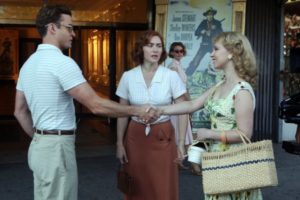WONDER WHEEL, written and directed by Woody Allen, is the narrative of four characters whose lives intertwine in a flurry of frustration, danger and passion amid the hustle and bustle of summertime Coney Island amusement park in the 1950s.
Ginny (Kate Winslet), is an emotionally unstable woman approaching her fortieth birthday; she senses that this landmark is synonymous with the steady erosion of her dreams of being a successful actress.
Humpty (Jim Belushi), Ginny’s craggy, hard-drinking carousel operator husband cares little for either her ambition or her pyromaniac son, Riche (Jack Gore).
Until meeting Mickey (Justin Timberlake), a good-looking young lifeguard who has aspirations of becoming a playwright, Ginny has only experienced true love once. She adored her first husband, a jazz drummer, but threw it all away with a dilettante affair that ended her marriage and left her married to Humpty and working as a waitress in a clam house.
Carolina (Juno Temple), Humpty’s long-estranged daughter, has left her gangster husband and is now lying low from the vengeance of the mob and a jilted husband in her father’s noisy fairground apartment.
Cinematographer Vittorio Storaro captures a tale of passion, violence, and betrayal that plays out against the picturesque if almost cartoon-like montage of 1950s Coney Island.
Is this Woody Allen at his brilliant best?
Categorically not, for this is a narrative that is predictable, moves with the pace of a freight train with the handbrake on and is tarnished by over-acting and a ‘50s soundtrack that serves but one purpose: to remind us to stay awake.
For sure, Storaro’s cinematography is a brilliant work of art, and the subtleties of lighting reflect delicately nuanced shifts of moods and for this alone, Wonder Wheel is a movie worth watching.
The performance of three of the four main characters is utterly wooden and tainted with overacting; only Timberlake, in his first collaboration with Allen, in both his role of narrator and as Mickey carries any authority, and his portrayal of the love-vulnerable but credible Micky is pretty much the only engine to drive this slow train forward.
The movie ends in the same insouciant manner as it begins; it would be hard to write a spoiler for this one.
As a story, it lacks narrative drive because the tension is there somewhere, but only in the
way that a snail lacks pace. Sure, conflict is to be found in all the obvious places, but the prospect of resolution is so remote as to render Wonder Wheel as dull as a dreary day in Coney Island.
This is a story that would have been better presented as a stage play. Or actually, come to think of it, as a musical.
The only real interest, for me, is whether Richie will burn down something big; maybe elevate himself to a stage of infamy that his mother would not achieve — but as an arsonist.
I watched Wonder Wheel yesterday afternoon in Wroclaw’s main cinema complex — a fine place with many cultural add-ons not normally found in cinemas in the UK.
Ten minutes into the movie, a person whose role was formally referred to as the usher, instructed me to stop unwrapping my sweets. The only reason I could attribute to this is that the barely audible noise was keeping other cinemagoers awake.
There is nothing wonderful about Wonder Wheel, where stereotype falls over stereotype.
I really hope Woody has another classic in him, but this is as far off the mark as is the notion of a Chinese garden in Greenwich Village in the ‘50s.


